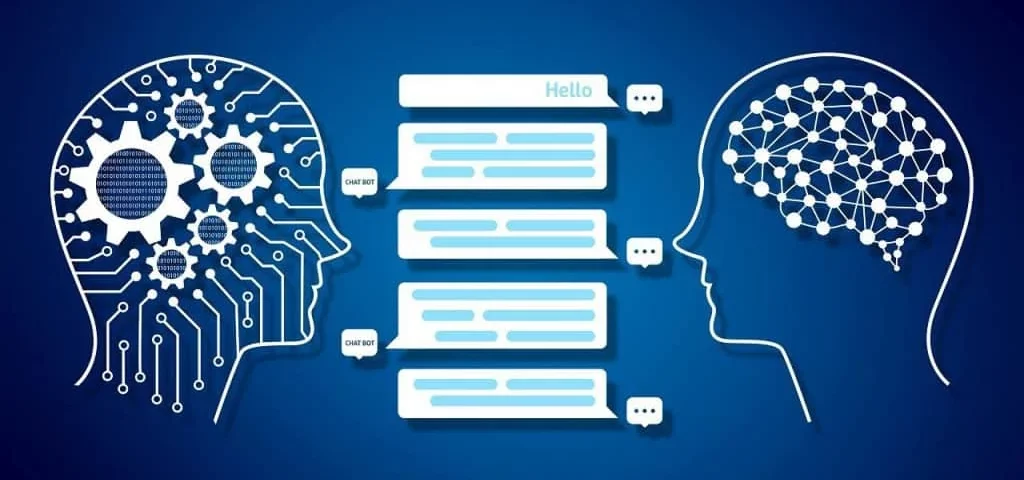NLP is a subcategory of AI that deals with the connection between humans and computers via natural language. As the AI services and industry continuously growing the demand for an NLP is revolutionizing.
According to Fortune Business Insights, the natural language processing (NLP) market is set to grow from $26.42 billion in 2022 to an astonishing $161.81 billion by 2029, at a cumulative CAGR of 18.1%!
To keep our learning up to date, we are going to discuss the how NLP works , industries using NLP, and future of NLP.

What is NLP? – Natural Language Processing
Natural Language Processing (NLP) is a branch of artificial intelligence (AI) that focuses on enabling computers to understand, interpret, and generate human language. In essence, it’s about teaching machines to communicate and interact with humans using natural language, like we do with each other.
NLP in Artificial Intelligence
AI systems that connect with NLP can adapt human language, which makes them more effective in performing tasks including customer support and communication.
To keep up with the latest industry trends it is foremost that we understand how NLP works.
How NLP works?
NLP works by breaking down the human language into smaller components including phrases, sentences, and terms. After that, it uses various techniques such as machine learning, deep learning, and natural language to derive meaning from the language. Natural language processing algorithms classify patterns in the language used to make predictions and generate responses.
To understand this in more detail, it is important to first clarify how data analysis, AI and machine learning works. If you want to read more about it, you can read our blogs.
Applications of NLP

Automate routine tasks: Chatbots made by NLP can process various tasks that are managed by human beings. This further results in saving valuable time for employees that can be implemented for further important work. Ex., a chatbot can work as a customer support assistant that can respond to various user queries.
Social media analytics: NLP can analyze user reviews on different social media platforms and make better sense of volumes of information. Sentiment analysis recognizes positive and negative comments on social media, offering direct insight into user sentiment in real-time.
Search engine optimization: NLP is the best tool for ranking in search engines by analyzing searches to optimize your content. The search engine uses NLP to rank its results, and knowing how to efficiently use these techniques makes it easier to be ranked above your competitors.
Moderating content: If your company receives a significant number of user or customer comments, NLP can help you control what is said to maintain quality and civility by assessing not only the words but also the tone and intent of the remarks.
Market insights: By using NLP to study your company’s customers’ language, you’ll have a better understanding of what they want and how to connect with them. Aspect-oriented sentiment analysis analyzes sentiment on social media about certain elements or products (for example, “the keyboard is great, but the screen is too dim”), providing immediately usable information for product design and marketing.
Industries Using Natural Language Processing
NLP simplifies various business processes mostly companies with unstructured text like emails, surveys, social media analytics, and more. With NLP businesses are expanding their data insights and making better business decisions.
Healthcare: As healthcare systems worldwide are using electronic health record systems, they deal with substantial amounts of unstructured data. NLP assists such practices in converting unstructured data into structured data to make the process efficient.
Legal: Lawyers must frequently spend hours studying enormous collections of documents and seeking evidence pertinent to a given case to prepare for it. NLP technology can automate the legal discovery process, saving time and reducing human error by filtering through vast amounts of information.
Finance: The financial sector evolves quickly, so any competitive advantage is valuable. In the financial industry, traders employ NLP technology to automatically extract information from company documents and press releases that are important to their portfolios and trading choices.
Customer service: Many large businesses use virtual assistants or chatbots to assist with basic customer inquiries and information requests (such as FAQs), delegating complicated questions to people as appropriate.
Final Thoughts
Natural Language Processing (NLP) is a wonderful field that enables computers to understand human language. NLP has enabled machines to process, interpret, and generate human language, opening up a plethora of opportunities in a variety of industries. NLP is revolutionizing how we engage with technology by powering virtual assistants and chatbots, as well as enabling sentiment analysis and language translation.
As NLP advances, we should expect progressively more sophisticated applications and breakthroughs. The potential for this technology to improve industries such as healthcare, education, and customer service is enormous. NLP drives innovation and shapes our world by unleashing the power of human language.

Why visitors still make use of to read news papers when in this technological world everything is existing on web?